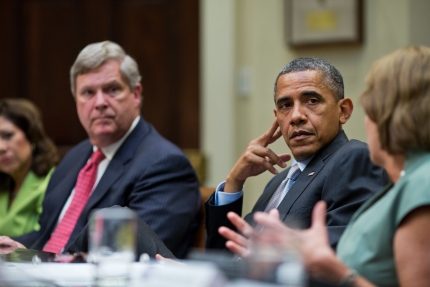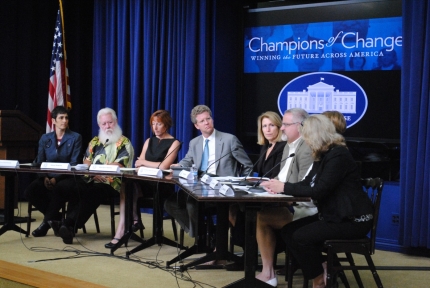Related Rural Blog Posts
Assistance for Small Businesses Affected by the Drought
Posted by on August 8, 2012 at 11:01 AM ESTEd note: this post was originally published on SBA.gov, the official site of the U.S. Small Business Administration
Yesterday, I attended a meeting of the White House Rural Council, which focused on our coordinated response to historic drought conditions that are affecting communities across Rural America.
Our goal at the SBA and across the Administration is making sure that these hard hit communities have the tools and the resources they need to navigate and recover from these severe drought conditions.
To date, the SBA has issued 71 agency drought declarations in 32 states covering more than 1,630 counties. These declarations allow small businesses, small agricultural cooperatives and non-farm small businesses that are economically affected by the drought in their community to apply for SBA’s Economic Injury Disaster Loan (EIDL).
To find out if your county has been declared a drought disaster area, view SBA's current disaster declarations page. And to learn more about how to apply for a disaster loan, go to the SBA Disaster Assistance section of the SBA Web site.
An Administration-Wide Response to the Drought
Posted by on August 7, 2012 at 4:19 PM ESTThroughout much of the country, communities are struggling with one of the worst droughts to strike the U.S. in decades. The lack of rain and high temperatures have done considerable damage to crops -- particularly those in the Midwest.
Today, President Obama met with the White House Rural Council to discuss the steps being taken to help farmers, ranchers, and small businesses wrestling with this crisis.
As part of that response, the U.S. Department of Agriculture today announced that it will provide millions of dollars in assistance to restore livestock lands affected by the drought. The USDA will spend $16 million on technical and financial assistance for those whose crops or herds have suffered.
The USDA has also reduced interest rates on its emergency loan program and worked with the major crop insurers to allow farmers to forego interest payments on unpaid premiums until November. The National Credit Union Administration also announced that more than 1,000 credit unions are increasing their lending to small businesses -- including farmers.
Making Federal Resources More Accessible for Rural Communities
Posted by on July 30, 2012 at 9:00 AM ESTFederal agencies often get requests from local governments and organizations—especially those in rural America—to make information about available grants and resources easier to access and understand. The HUD-DOT-EPA Partnership for Sustainable Communitiesand USDA have just released a publication that does that. Federal Resources for Sustainable Rural Communities is a guide to programs from the four agencies that rural communities can use to promote economic competitiveness, protect healthy environments, and enhance quality of life. It provides key information on funding and technical assistance opportunities as well as examples of how rural communities across the country have put these programs into action to achieve their goals. With this menu of options, local leaders can more easily identify federal resources that support community planning, cost-effective infrastructure, economic development, brownfields revitalization, and other activities that are part of achieving sustainable communities. They can also see program eligibility and matching requirements at a glance.
The White House Rural Council has heard from many stakeholders that keeping track of federal funding availability, researching program requirements, and completing applications can be a heavy burden for communities, particularly small rural communities with limited staff capacity.
Learn more about RuralKnow Your Farmer, Know Your Food - Across the United States
Posted by on July 17, 2012 at 3:34 PM ESTToday, I hosted a Google+ Hangout with Agriculture Deputy Secretary Kathleen Merrigan to highlight efforts to strengthen local and regional food systems across the United States.
The event was an opportunity to talk about local food with inspiring women from around the country, from Valerie Segrest, of the Muckelshoot Indian Tribe near Seattle, WA, who sees local and traditional foods as a way to preserve her heritage, to Mayor Stephanie Rawlings-Blake of Baltimore, MD, who has made great strides in building her city’s local food system to increase access to healthy affordable food. You can watch the full video from the hangout below or on YouTube.
The hangout also marked the launch of the 2.0 version of the USDA’s Know Your Farmer, Know Your Food Compass. An innovative digital guide and map, the KYF Compass highlights USDA-supported local food projects around the country. The 2.0 version features thousands of local food projects in all 50 states and includes keyword and zip code search features.
White House Champions in the Fight Against Youth Homelessness, Let's Move Olympics, Google Hangout on Local Foods
Posted by on July 17, 2012 at 9:30 AM ESTWhite House Honors “Champions of Change” in the Fight Against Youth Homelessness
Last week, The White House Office of Public Engagement honored 13 individuals who have made significant differences in the way their communities combat homelessness among children and youth as Champions of Change.
The Champions of Change series spotlights everyday heroes who are demonstrating a commitment to improving their own communities, their country, or the lives of their fellow citizens. We are looking for you to nominate someone who is doing extraordinary things to make a difference in your community as a “Champion of Change.”
Learn more about , RuralJoin a White House Hangout on Local Foods
Posted by on July 13, 2012 at 9:52 AM ESTIn every state, people are connecting directly with their food each time they bite into a local apple, grill a local steak or create a salad with local ingredients. Local food is about the products that farmers and ranchers grow and raise. It’s about the businesses that bring food from farms to our tables, and efforts to connect consumers with producers like farm to school and agritourism. And it’s about the sense of pride behind campaigns like “Buy Fresh, Buy Local,” “Appalachian Grown,” or “Idaho Preferred” that let consumers know their food dollar is flowing back into their local economy. Women play a prominent role in developing local and regional food systems that are creating jobs, pulling new people into agriculture, connecting communities, and improving health.
On Tuesday, July 17th at 3:00pm EDT, Jon Carson, White House Director of Public Engagement, and I will join inspiring women leaders in the field of local foods through a Google+ Hangout to hear their stories and answer your questions. It’s also a chance to see more stories like theirs when we unveil the 2.0 version of the USDA’s Know Your Farmer, Know Your Food Compass. An innovative digital guide and map, the KYF Compass highlights USDA-supported local food projects around the country. The 2.0 version features thousands of local food projects in all 50 states and includes keyword and zip code search features.
Will you join us? Here are the details:
- When: Join us at 3 p.m. EDT on Tuesday, July 17th, 2012
- Where: Watch on WhiteHouse.gov/live, or on the White House Google+ page
- Engage: Ask questions and join the discussion on the White House Google+ Page, on Twitter using the hashtag #WHHangout, or here. Questions can be submitted ahead of time and during the event.
- &lsaquo previous
- …
- 5
- 6
- 7
- 8
- 9
- 10
- 11
- 12
- 13
- …
- next &rsaquo


